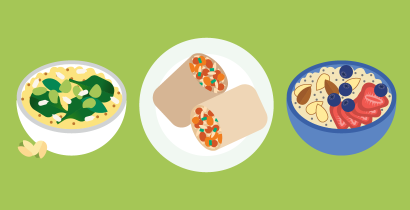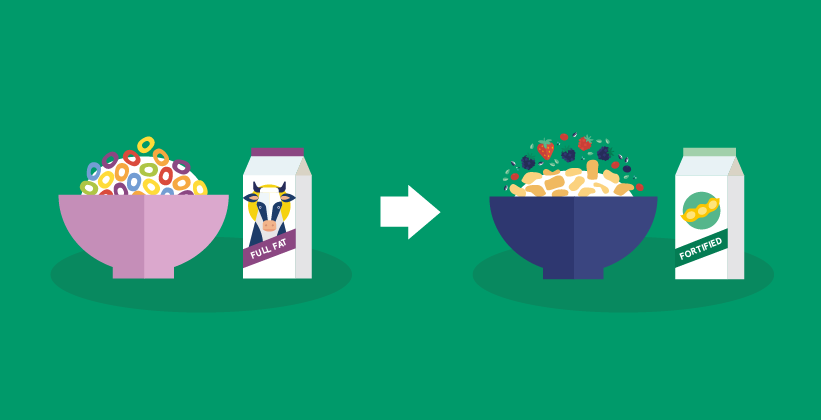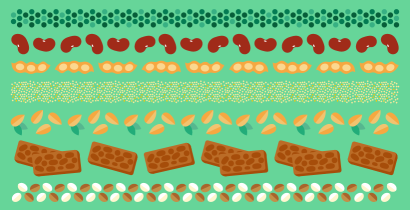What’s Important for Vegetarians and Vegans to Eat?
Last Updated : 14 October 2024Many people choose to exclude meat and other animal products from their diet for a variety of reasons and to varying extents. Whatever the reason, careful planning is needed to ensure adequate nutrient intakes.
Avoiding deficiency
‘Vegetarianism’ encompasses a range of dietary patterns. Lacto-ovo-vegetarians eat dairy products and eggs, pesco-vegetarians (or pescatarians) eat all seafood on top of the foods eaten by lacto-ovo-vegetarians, and vegans do not eat any food of animal origin (including honey). The more restricted the diet, the more care needs to be taken to get all nutrients required by the body. In plant-based diets, several key nutrients may be deficient, absent or poorly absorbed from the gut. These include high quality protein, very long chain omega-3 fatty acids (eicosapentaenoic acid (EPA), docosahexaenoic acid (DHA)), iron, zinc, calcium and vitamins D and B12.
In vegetarian and vegan diets, several key nutrients may be deficient, absent or poorly absorbed from the gut. These include high quality protein, very long chain omega-3 fatty acids (eicosapentaenoic acid (EPA), docosahexaenoic acid (DHA)), iron, zinc, calcium and vitamins D and B12.
Intakes of these nutrients are usually adequate in pescatarian and lacto-ovo-vegetarian diets. However, iron stores tend to be lower in vegetarians and vegans because the most readily absorbed form of iron, haem iron, is only found in meat, poultry and fish.1 Anaemia due to severe prolonged iron deficiency is no more common in vegetarians than non-vegetarians; children and pre-menopausal women are at greatest risk.1,2 Vegans may have low intakes of calcium, which, when combined with low intakes of protein and vitamin D, can adversely affect bone health.2 Another important nutrient to consider for vegetarians, and vegans is vitamin B12, as it is found only in animal-sourced foods. Deficiency of vitamin B12 during pregnancy can cause irreversible neurological damage to the foetus.3,4 Furthermore, it is also associated with high blood levels of homocysteine, a known risk factor for cardiovascular disease.5
Fatty fish such as salmon, herring and mackerel are rich sources of the omega-3 fatty acids EPA and DHA, which are important for brain development, normal vision, heart health and certain other bodily functions. EPA can also be synthesised in sufficient quantities by the human body if the precursor alpha-linolenic acid (ALA) is provided through diet. Valuable vegetarian sources of ALA are plant and seed oils, especially walnut and rapeseed oil. Synthesis of DHA from ALA, however, is much less efficient and supplementation may thus be required to meet bodily needs.6
Table 1 - Critical nutrients in the vegetarian/vegan diet and their dietary reference values (DRV's) for adults7
|
Nutrient |
Dietary reference value (DRV) |
Plant-based source |
|
Calcium (mg/day) |
950 |
Calcium-set tofu, fortified foods |
|
Iron (mg/day) |
11 (*16) |
lentils, chickpeas, beans, tofu, cashew nuts, chia seeds, fortified foods |
|
Zinc (mg/day) |
9.4-16.3 (*7.5-12.7) |
beans, chickpeas, lentils, tofu, walnuts, cashew nuts, quinoa |
|
Vitamin D (µg/day) |
15 |
fortified foods, supplements |
|
Vitamin B12 (µg/day) |
4 |
yeast extract, fortified foods, supplements |
|
EPA/DHA (mg/day) |
250 |
rapeseed oil, pumpkin seeds and sunflower seeds are good sources of ALAǂ supplements |
*Population reference intake (PRI) for premenopausal women7
ǂalpha-linolenic acid which can be converted to EPA and DHA by the body
Abbreviations: EPA = eicosapentaenoic acid; DHA = docosahexaenoic acid
Nutritional support
A wide range of products are currently available to support the nutrient requirements of vegetarians and vegans. Some examples are non-dairy milks, fortified foods such as breakfast cereals, juices and spreads, as well as supplements. Meat-free alternatives, including meat ‘analogues’, which resemble meat in texture, can be substituted for meat in recipes. Vegetarian ready meals are widely available and many manufacturers voluntarily label their products as suitable for vegetarians or vegans. Otherwise, the list of ingredients, which is a mandatory labelling element on food and drink packages in Europe, provides all the information required to assess the suitability of a specific product in the context of a vegetarian or vegan diet.
Soy, in its various forms (plain beans, tofu, etc.), is a useful addition to the vegetarian/vegan diet. It can meet protein needs as effectively as animal protein, and some preparations can be considered sources of the omega-3 fatty acid ALA (but not EPA and DHA).9 Soy is also rich in iron, but its absorption can be limited. Vitamin C can increase the absorption of iron from plant-based sources such as soy. Some minor plant compounds in soy – referred to as phytochemicals – are also thought to have a protective effect against cardiovascular disease, osteoporosis and some cancers.2,9 Note that other beans and legumes are also good sources of protein and minerals.
The Microbiomes4Soy project
Microbiomes4Soy is an EU-funded project that is advancing the role of soy as a sustainable protein source by enhancing the productivity and nutritional value of the crop. By leveraging microbiome-based research, this initiative aims to contribute to healthier plant-based protein alternatives.
As well as being good sources of high-quality protein, dairy products and eggs are suitable vegetarian sources of vitamin B12. Vitamin B12 is one of the most critical nutrients for vegans to supplement or they would need to rely on yeast extract spreads to meet their requirements.
Potential health benefits
If planned well, vegetarian diets are characterised by a relatively higher consumption of fruit, vegetables, legumes and nuts. Compared to omnivore diets, they tend to be lower in saturated fat and cholesterol but higher in fibre, vitamins C and E, magnesium, potassium and phytochemicals, such as flavonoids and carotenoids. Such diets are thought to confer a protective effect against a number of chronic diseases and may contribute to the lower body mass index (BMI) values that are seen in vegetarians, particularly vegans.2,10-13 It should be noted though that body weight or BMI alone are not suitable indicators of good health. Given the somewhat restrictive nature of vegan diets in particular, a lower body weight may be brought about merely from reduced and/or monotonous food intake.
The cardiovascular benefits of low meat consumption may be due, in part, to improved blood lipid profiles and lower blood pressure levels that are typically seen in vegetarians, as well as the beneficial effects of certain phytochemicals on cardiovascular function. Vegetarians are at lower risk of developing type 2 diabetes than meat eaters.2 This is partly due to the lower BMI of vegetarians, but there is an additional risk associated with eating meat, particularly processed meat (e.g. bacon, ham, salami). Diets rich in whole grain foods, nuts and legumes can substantially reduce the risk of developing the condition and improve blood sugar control in those already affected. A recent study has also shown a benefit of a vegetarian diet for metabolic syndrome.13
In summary
For those wishing to eat less animal foods or cut them out altogether, careful meal planning is required to ensure nutritional needs are not compromised. The most critical nutrients in this respect are vitamin B12, vitamin D, calcium, iron, zinc and the omega-3 fatty acids EPA and DHA. If executed well, vegetarian diets can be a viable alternative, yet a higher fruit and especially vegetable intake remains an important goal for vegetarians and meat eaters alike.

Microbiomes4Soy has received funding from the European Union’s Horizon Europe research and innovation programme under grant agreement No 101083671.
References
- Hercberg S, Preziosi P, Galan P. (2001). Iron deficiency in Europe. Public Health Nutr 4(2B):537-545.
- American Dietetic Association (2009). Position of the American Dietetic Association: Vegetarian Diets. J Am Diet Assoc 109:1266-1282.
- Koebnick C et al. (2004). Long-term ovo-lacto vegetarian diet impairs vitamin B-12 status in pregnant women. J Nutr 134(12):3319-3326.
- Weiss R, Fogelman Y, Bennett M. (2004). Severe vitamin B12 deficiency in an infant associated with a maternal deficiency and a strict vegetarian diet. J Pediatr Hematol Oncol 26(4):270-271.
- Craig WJ. (2009). Health effects of vegan diets. Am J Clin Nutr 89:1627S-1633S.
- Brenna JT, Salem N Jr, Sinclair AJ, Cunnane SC; International Society for the Study of Fatty Acids and Lipids, ISSFAL. (2009). alpha-Linolenic acid supplementation and conversion to n-3 long-chain polyunsaturated fatty acids in humans. Prostaglandins Le
- European Food Safety Authority (EFSA). Dietary reference values and dietary guidelines. Acessed: 2017.
- Commission Directive 2008/100/EC of 28 October 2008 amending Council Directive 90/496/EEC on nutrition labelling for foodstuffs as regards recommended daily allowances, energy conversion factors and definitions (Text with EEA relevance). OJ L 285, 29.10
- Messina M, Messina V. (2010). The role of soy in vegetarian diets. Nutrients 2:855-888.
- Norat T et al. (2010). WCRF/AICR Systematic Literature Review Continuous Update Project Report. The Associations between Food, Nutrition and Physical Activity and the Risk of Colorectal Cancer.
- Sinha R et al. (2009). Meat intake and mortality. Arch Int Med 169:562-571.
- Rizzo NS et al. Vegetarian Dietary Patterns Are Associated With a Lower Risk of Metabolic Syndrome: The Adventist Health Study 2. Diabetes Care. 2011 Mar 16. [Epub ahead of print].
- Sabate J. (2003). The contribution of vegetarian diets to human health. Forum Nutr 56:218-20.


